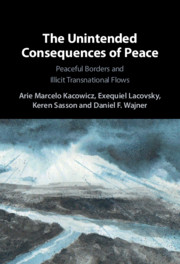
- Cited by 4
-
Cited byCrossref Citations
This Book has been cited by the following publications. This list is generated based on data provided by Crossref.
Wajner, Daniel F. and Roniger, Luis 2022. Populism and Transnational Projection: The Legitimation Strategies of Pink Tide Neo-Populist Leaderships in Latin America. Comparative Political Theory, Vol. 2, Issue. 2, p. 118.
Lehrs, Lior 2023. Interlocking peace processes: Between competing and complementing peacemaking efforts in interlocking conflicts. Cooperation and Conflict, Vol. 58, Issue. 4, p. 485.
Simmons, Beth A. and Shaffer, Robert 2023. Border Anxiety in International Discourse. American Journal of Political Science,
Friesen, Isaac 2024. Local Ethics and Conflicts of Interest: Living Between Bottom-Up from Top-Down Peace in Provincial Egypt. Journal of Peacebuilding & Development,
- Publisher:
- Cambridge University Press
- Online publication date:
- June 2021
- Print publication year:
- 2021
- Online ISBN:
- 9781009003537




